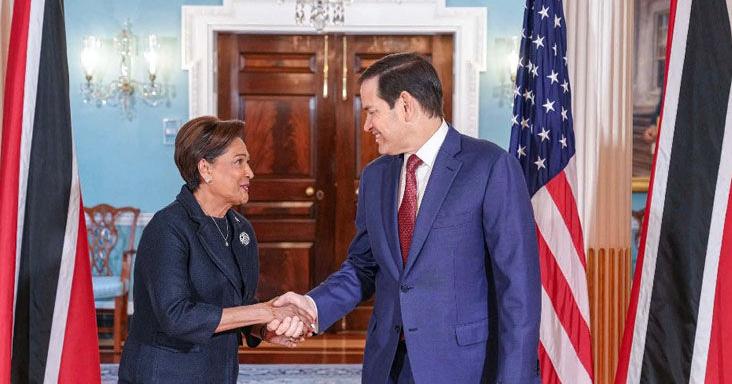Five months after Prime Minister Kamla Persad-Bissessar declared the Dragon gas deal “dead”, it seems to have been resuscitated.
The latest development in the cross-border Trinidad and Tobago-Venezuela natural gas project followed Prime Minister Kamla Persad-Bissessar’s meeting yesterday with United States Secretary of State Marco Rubio.
MEETING RUBIO: Prime Minister Kamla Persad-Bissessar introduces members of her Cabinet to US Secretary of State Marco Rubio, right, at the State Department yesterday in Washington, DC. From left, Sean Sobers, Minister of Foreign and Caricom Affairs; Barry Padarath, Minister of Public Utilities; Saddam Hosein, Minister of Legal Affairs; Nicholas Morris, Parliamentary Secretary in the Ministry of Foreign and Caricom Affairs; and Randall Karim, Head of the Foreign Service.
The meeting took place at the US Department of State in Washington, DC, at 10 a.m., after which the Prime Minister took a three-hour train ride back to New York.
She was accompanied by Foreign and Caricom Affairs Minister Sean Sobers, Public Utilities Minister Barry Padarath, Legal Affairs Minister Saddam Hosein, head of the Foreign Service Randall Karim, and Foreign Service Officer Venessa Ramhit Ramroop.
PM: ‘Good news’ from Washington
Following the meeting with Rubio, a video update was posted to Persad-Bissessar’s Facebook page, in which she stated there were important discussions on bilateral interests and that there was “good news” for Trinidad and Tobago.
Later, the Office of the Prime Minister issued a news release confirming the US has expressed support for the development of Trinidad and Tobago’s hydrocarbon cross-border resources.
The release stated this support was secured during high-level discussions with Rubio, and that the talks focused on mutual interests affecting both countries in the areas of national security, energy security, and economic security.
During the meeting, Rubio thanked Persad-Bissessar and her Government for their “strong political and technical leadership”, and both sides reaffirmed the “strong and enduring partnership” between the nations—grounded in deep historic ties and shared goals for regional security and prosperity.
With respect to energy security, the statement noted the Prime Minister engaged in “intensive discussions” with Rubio, who assured her Trinidad and Tobago’s prosperity was in the interest of the United States.
State Department confirms support
The release concluded: “Subsequent to the meeting, the Government of Trinidad and Tobago was informed that the Secretary of State supports the approval of the relevant Office of Foreign Assets Control (OFAC) licences to begin discussions toward developing its cross-border hydrocarbons.”
Following the meeting, the US Department of State also issued a news release from principal deputy spokesperson Tommy Pigott.
While the Trinidad and Tobago Government’s release did not explicitly mention the Dragon gas deal, the State Department’s release did.
It stated Rubio met with Persad-Bissessar to discuss the strong US-Trinidad and Tobago partnership, with a focus on regional security and counter-narcotics co-operation.
It added the US Secretary of State commended Trinidad and Tobago’s steps to counter transnational criminal organisations and curb illicit narcotics and firearms trafficking.
The leaders also discussed efforts to restore stability in Haiti, including support for the UN Security Council resolution authorising a UN Support Office for Haiti and Gang Suppression Force.
On the key issue of energy security, the release stated Rubio outlined US support for the Government’s Dragon gas proposal, but emphasised it must not benefit the regime of Venezuelan President Nicolas Maduro.
The release stated: “The Secretary acknowledged the importance of energy security to Trinidad and Tobago’s economic prosperity and regional stability. He outlined US support for the Government’s Dragon gas proposal and steps to ensure it will not provide significant benefit to the Maduro regime.
The Secretary emphasised that deepening US-Trinidad and Tobago cooperation will be critical to disrupting narco-trafficking networks, strengthening regional security, and safeguarding our region.
